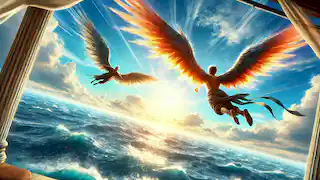Long ago, in the sun-soaked lands of ancient Greece, where the gods walked among mortals and myths were born from the very fabric of life, a brilliant man named Daedalus lived. He was a master craftsman, an inventor whose genius was unparalleled across the known world. His fame spread from Athens to Crete, and his creations amazed kings, warriors, and common folk alike.
Daedalus had many incredible achievements to his name, but perhaps none were as famous as the labyrinth he constructed for King Minos of Crete. This sprawling, twisting maze was designed to house the monstrous Minotaur, a fearsome beast with the body of a man and the head of a bull, the cursed offspring of Queen Pasiphaë and a bull. The labyrinth was so complex that it was said once a person entered its winding passages, they could never find their way out.
Despite his brilliance, Daedalus found himself caught in a web of power and deceit. His creation of the labyrinth pleased King Minos, but it also made the king suspicious. Minos feared that Daedalus knew too much about the inner workings of his palace and the secrets of Crete, particularly concerning the Minotaur. He worried that Daedalus might share this knowledge with his enemies or, worse yet, use it against him.
And so, despite his talents and the favors he had done for the king, Daedalus and his young son, Icarus, were imprisoned on the island of Crete. They were kept under constant watch, unable to leave the island or communicate with the outside world. Minos, paranoid and calculating, ensured that they would be useful only to him, trapped in a gilded cage of the king’s making.
The days turned into weeks, and the weeks into months, as Daedalus and Icarus languished on the island. Though they lived in relative comfort, their hearts were heavy with the burden of captivity. For Daedalus, a man whose mind was always searching for the next great idea, the confinement was unbearable. He longed to be free, to create and explore beyond the boundaries of the island. His son, Icarus, still young and full of life, grew restless as well. He had inherited his father's curiosity and ingenuity, and the thought of living out his days in captivity weighed heavily on him.
As Daedalus pondered their situation, an idea began to form in his mind. He spent hours observing the birds that soared effortlessly through the skies above the island, marveling at how they were free to travel wherever the winds carried them. It was then that inspiration struck. If he and Icarus could not escape by land or sea, perhaps they could escape by air.
Determined to put his plan into action, Daedalus began collecting materials in secret. He gathered feathers from the birds that inhabited the island, collecting them in various sizes, from small, delicate down feathers to large, strong flight feathers. He also gathered wax from the beehives he found in the crevices of the rocky cliffs. Slowly, carefully, Daedalus began constructing wings—two sets, one for himself and one for his son.

He used the larger feathers to form the frame of the wings, binding them together with the wax. The smaller feathers were layered on top, creating a surface that could catch the wind and lift them into the sky. For days, Daedalus worked tirelessly, perfecting his design. His hands moved with the precision of a master craftsman, but his heart was heavy with the knowledge that this plan, like all others, was not without risk.
At last, the wings were ready. Daedalus called Icarus to his side and showed him the delicate creations. The boy’s eyes lit up with wonder and excitement at the sight of the wings. He could hardly believe that such a thing was possible—that they could fly like the birds and leave their captivity behind. But Daedalus, ever the cautious inventor, knew that this flight would not be without danger.
"My son," Daedalus said gravely as he began to fasten the wings to Icarus’s arms, "these wings are fragile, and our flight will be treacherous. You must listen carefully to my instructions. Fly neither too high nor too low. If you fly too low, the sea's spray will dampen the feathers and make them too heavy to support you. If you fly too high, the heat of the sun will melt the wax that binds the wings together. You must keep to the middle path, where the air is steady, and you will be safe."
Icarus listened to his father’s words, but his youthful exuberance made it difficult to fully comprehend the gravity of the situation. To him, this was an adventure, a chance to experience something no other mortal had before. The idea of flying filled him with excitement, and he could hardly wait to feel the wind beneath his wings.
As dawn broke the next day, Daedalus and Icarus stood on the edge of a high cliff that overlooked the vast sea. The sun was just beginning to rise, casting a golden glow across the water and painting the sky with hues of pink and orange. It was the perfect time to take flight, before the heat of the day could become a threat.
With a deep breath, Daedalus looked at his son one last time before they jumped. For a moment, they seemed to fall, their bodies plummeting toward the sea below. But then, the wind caught in their wings, and they began to rise. Slowly at first, then faster and faster, they soared into the sky, leaving the island of Crete behind.

For Daedalus, the flight was a mixture of exhilaration and anxiety. He had spent years as a captive, his creativity stifled by the walls that surrounded him. Now, for the first time in what felt like an eternity, he was free, soaring through the air like the very birds that had inspired his invention. But his joy was tempered by the constant worry for his son. He watched Icarus closely, calling out to him to stay near and reminding him of the dangers that lay above and below.
At first, Icarus heeded his father’s advice. He flew steadily, keeping to the middle path as instructed. The wind rushed past his face, lifting him higher and higher above the sea. He had never felt so alive, so powerful. The world stretched out before him, vast and endless, and he felt as though he could fly forever.
But as the minutes passed, Icarus began to grow more confident. He started to test the limits of his wings, climbing higher into the sky. The thrill of flight was intoxicating, and the higher he flew, the more invincible he felt. His father’s warnings faded from his mind as he became consumed by the sheer joy of soaring through the heavens.
Daedalus, still flying below, called out to his son. "Icarus! Remember what I told you! Stay close to me, and do not fly too high!" But Icarus, caught up in the thrill of his newfound freedom, did not listen. He wanted to fly higher, to reach the very limits of the sky, to touch the sun itself.
The sun grew hotter as Icarus climbed higher and higher. The air thinned, and the heat began to affect the wax that held his wings together. At first, it was only a few drops of wax that softened and dripped away, but soon the entire structure of the wings began to weaken. The feathers that had once been tightly bound together started to loosen, falling away one by one.

Icarus, realizing too late what was happening, tried desperately to maintain his altitude, but it was no use. His wings were failing him. The wax melted faster and faster, and the feathers continued to fall away, leaving him with nothing but the bare bones of the wings his father had crafted.
Panic set in as Icarus began to plummet. He flapped his arms wildly, trying to stay aloft, but it was no use. The ground rushed up to meet him, and with a final cry, Icarus fell into the sea below, disappearing beneath the waves.
Daedalus, who had been watching from below, saw his son fall and let out a cry of anguish. He descended as quickly as he could, frantically searching the water for any sign of Icarus. But the sea, vast and unforgiving, had already claimed him.
For days, Daedalus wandered the shores of nearby islands, hoping against hope that he might find his son washed ashore. But no matter where he searched, there was no trace of Icarus. His boy was gone, lost to the depths of the sea.

Heartbroken and grief-stricken, Daedalus made his way to Sicily, where he sought refuge in the court of King Cocalus. Though he was welcomed as a guest and given a place of honor, Daedalus could not escape the heavy burden of his guilt. He had given his son the wings that had allowed him to fly, but in doing so, he had also set in motion the events that led to his demise.
The story of Daedalus and Icarus has been passed down through the ages, a cautionary tale of hubris, ambition, and the consequences of ignoring the wisdom of those who came before us. It is a story that reminds us of the dangers of overreaching, of pushing beyond our limits without regard for the consequences.

The name of Icarus has become synonymous with the idea of flying too close
to the sun—of being blinded by ambition and losing sight of the dangers that lie ahead. It is a tale that continues to resonate with us today, as we strive to achieve great things, but must always remember to temper our ambitions with humility and care.



















